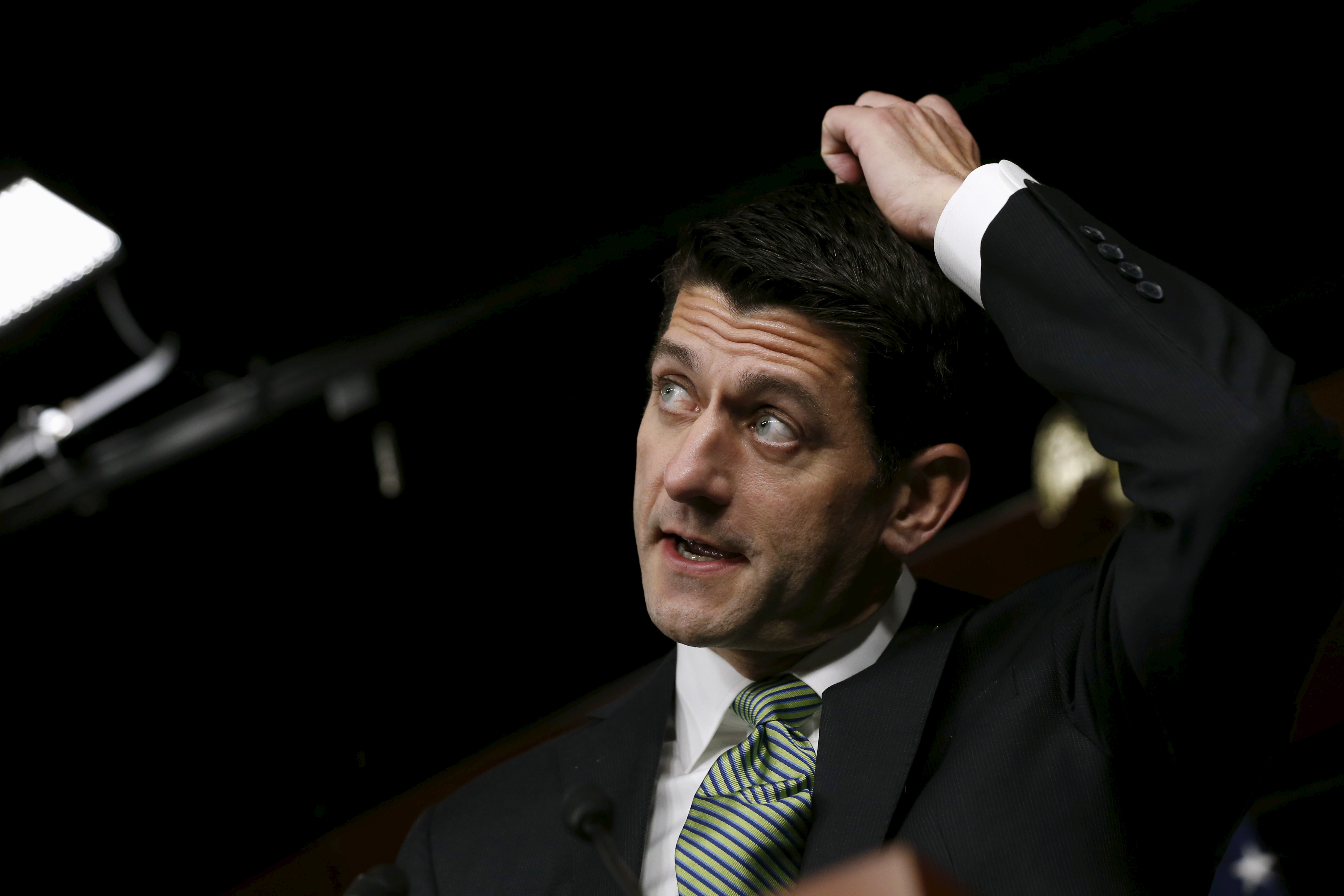Paul Ryan is about to bang right into the debt ceiling
Can the House speaker survive the same crisis that toppled John Boehner?


A free daily email with the biggest news stories of the day – and the best features from TheWeek.com
You are now subscribed
Your newsletter sign-up was successful
Way back in October 2015, John Boehner gave Paul Ryan a wonderful gift. Boehner, who had announced his resignation as House speaker under threat of eviction by his own Republican majority, wanted to make sure that Ryan, his successor, started his own tenure as smoothly as possible. To grease the skids for Ryan, Boehner worked out a budget agreement with the Obama White House to modestly increase spending and push off the next debt-limit increase until 2017.
At the time, hardline conservatives in the House wanted to hold the debt limit hostage in order to squeeze the White House into accepting spending cuts, which threatened to trigger a default on interest payments for the government's debts. Boehner's own speakership had been crippled by intraparty political fights over these issues, so with one foot out the door he cut a deal with the Democrats to make sure this potential crisis was cleared from Ryan's immediate path.
Because D.C. is a terminally stupid place that is powered by ridiculous acts of political theater, Ryan responded to Boehner's magnanimity by attacking the outgoing speaker and saying nasty things about the budget deal (while also making it clear that the deal would pass). Promising a break with the Boehner era, Ryan said that the debt limit would be dealt with differently the next time. "Under new management, we are not going to do the people's business this way," he said. "As a conference we should have been meeting months ago to discuss these things, to have a unified strategy going forward."
The Week
Escape your echo chamber. Get the facts behind the news, plus analysis from multiple perspectives.

Sign up for The Week's Free Newsletters
From our morning news briefing to a weekly Good News Newsletter, get the best of The Week delivered directly to your inbox.
From our morning news briefing to a weekly Good News Newsletter, get the best of The Week delivered directly to your inbox.
Well, guess what? The time Boehner bought for Ryan has just about run out, and Ryan — promises to have a "unified strategy" notwithstanding — is about to blunder into another debt-limit crisis just like his predecessor did.
The obstacle facing Paul Ryan in 2017 is the same one Boehner struggled to surmount: Conservatives in the party want to leverage the threat of debt default to force passage of their own legislative priorities. As The Huffington Post's Matt Fuller reports, the ultra-conservative House Freedom Caucus is looking to use the debt-limit fight to massively cut spending, or pass an ObamaCare repeal, or enact some other pie-in-the-sky proposal that will never overcome a filibuster from Democrats in the Senate.
Meanwhile, the rest of the GOP can't seem to agree on the best course of action — Trump administration officials have said they want to just raise the debt limit with no strings attached, while Republicans in the Senate are conflicted and unclear as to what they want to do. The utter lack of cohesion among the party controlling the legislature is worrisome given that Congress is bumping up against a hard deadline and risks kicking the legs out from underneath the economy with a needless, self-inflicted debt default.
This dynamic puts Ryan and the GOP in a perilous situation, along with the country at large. In keeping with the longstanding dysfunction within Republican politics, the simplest answer to this looming crisis — enlisting Democrats to increase the debt limit with no other policy riders — will meet the stiffest resistance from within the party. Should Ryan and the rest of the leadership opt for this strategy they'll help avert an economic implosion, but they'll also face a brewing mutiny among the party's hard-right faction, which will complain that conservative principles are once again being forsaken.
A free daily email with the biggest news stories of the day – and the best features from TheWeek.com
This situation is dangerous for Ryan in particular, given that Boehner's fate as speaker was ultimately sealed when the hardliners turned on him for abandoning their principles. Ryan's legislative record thus far is unimpressive, even though Republicans control Congress and the White House. The speaker burned through valuable time and political capital to drag the wheezing pre-corpse of the American Health Care Act over the finish line, only to see the whole legislative push collapse in the Senate. He's talking a big game with regard to tax reform, but no one seems to know what Ryan has in mind or how he can get it passed.
If Ryan goes ahead and passes a "clean" debt-limit hike after wasting almost an entire year with no major legislative accomplishments, the same lawmakers who conspired to oust Boehner would understandably start to wonder what, exactly, has changed.
The only solace Ryan might be able to take is that this same problem would afflict anyone who suffered the misfortune of leading today's Republican Party. Leadership in government will ultimately require some level of compromise, and that inescapable reality is unacceptable to an extreme faction of the party that demands ideological rigidity even when the basic functions of government are put at risk.
Simon Maloy is a political writer and researcher in Washington, DC. His work has been published by The Huffington Post, The American Prospect, and Salon.
-
 Political cartoons for February 16
Political cartoons for February 16Cartoons Monday’s political cartoons include President's Day, a valentine from the Epstein files, and more
-
 Regent Hong Kong: a tranquil haven with a prime waterfront spot
Regent Hong Kong: a tranquil haven with a prime waterfront spotThe Week Recommends The trendy hotel recently underwent an extensive two-year revamp
-
 The problem with diagnosing profound autism
The problem with diagnosing profound autismThe Explainer Experts are reconsidering the idea of autism as a spectrum, which could impact diagnoses and policy making for the condition
-
 The billionaires’ wealth tax: a catastrophe for California?
The billionaires’ wealth tax: a catastrophe for California?Talking Point Peter Thiel and Larry Page preparing to change state residency
-
 Bari Weiss’ ‘60 Minutes’ scandal is about more than one report
Bari Weiss’ ‘60 Minutes’ scandal is about more than one reportIN THE SPOTLIGHT By blocking an approved segment on a controversial prison holding US deportees in El Salvador, the editor-in-chief of CBS News has become the main story
-
 Has Zohran Mamdani shown the Democrats how to win again?
Has Zohran Mamdani shown the Democrats how to win again?Today’s Big Question New York City mayoral election touted as victory for left-wing populists but moderate centrist wins elsewhere present more complex path for Democratic Party
-
 Millions turn out for anti-Trump ‘No Kings’ rallies
Millions turn out for anti-Trump ‘No Kings’ ralliesSpeed Read An estimated 7 million people participated, 2 million more than at the first ‘No Kings’ protest in June
-
 Ghislaine Maxwell: angling for a Trump pardon
Ghislaine Maxwell: angling for a Trump pardonTalking Point Convicted sex trafficker's testimony could shed new light on president's links to Jeffrey Epstein
-
 The last words and final moments of 40 presidents
The last words and final moments of 40 presidentsThe Explainer Some are eloquent quotes worthy of the holders of the highest office in the nation, and others... aren't
-
 The JFK files: the truth at last?
The JFK files: the truth at last?In The Spotlight More than 64,000 previously classified documents relating the 1963 assassination of John F. Kennedy have been released by the Trump administration
-
 'Seriously, not literally': how should the world take Donald Trump?
'Seriously, not literally': how should the world take Donald Trump?Today's big question White House rhetoric and reality look likely to become increasingly blurred
